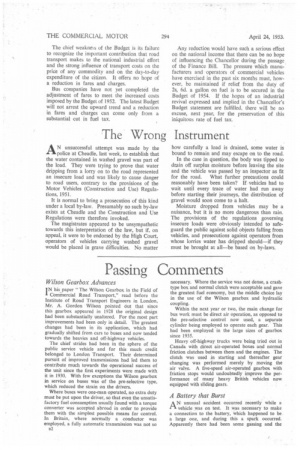The Wrong Instrument
Page 36

If you've noticed an error in this article please click here to report it so we can fix it.
AN unsuccessful attempt was made by the police at Cheadle, last week, to establish that the water contained in washed gravel was part of the load. They were trying to prove that water dripping from a lorry on to the road represented an insecure load and was likely to cause danger to road users, contrary to the provisions of the Motor Vehicles (Construction and Use) Regulations, 1951.
It is normal to bring a prosecution of this kind under a local by-law. Presumably no such by-law exists at Cheadle and the Construction and Use Regulations were therefore invoked.
The magistrates appeared to be unsympathetic towards this interpretation of the law, but if, on appeal, it were to be endorsed by the High Court, operators of vehicles carrying washed gravel would be placed in grave difficulties. No matter how carefully a load is drained, some water is bound to remain and may escape on to the road.
In the case in question, the body was tipped to drain off surplus moisture before leaving the site and the vehicle was passed by an inspector as fit for the road. What further precautions could reasonably have been taken? If vehicles had to wait until every trace of water had run away before starting their journeys, the distribution of gravel would soon come to a halt.
Moisture dropped from vehicles may be a nuisance, but it is no more dangerous than rain. The provisions of the regulations governing insecure loads were obviously intended to safeguard the public against solid objects falling from vehicles, and prosecutions against operators from whose lorries water has dripped should—if they must be brought at all—be based on by-laws.




































































































